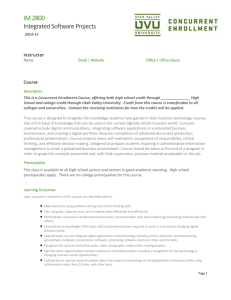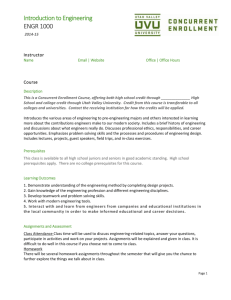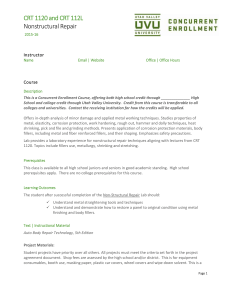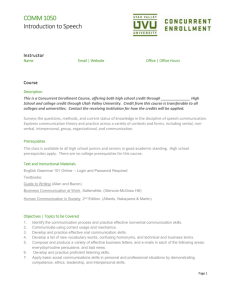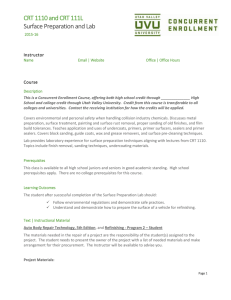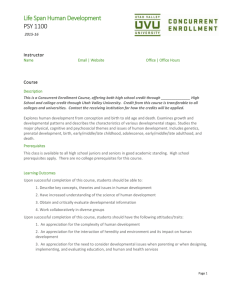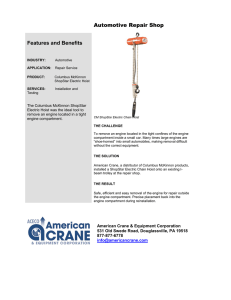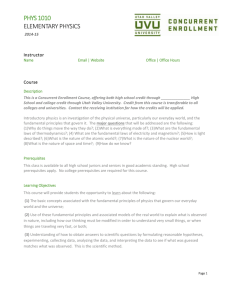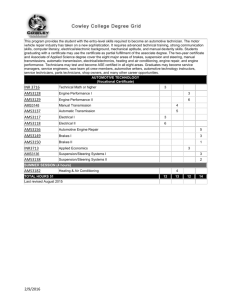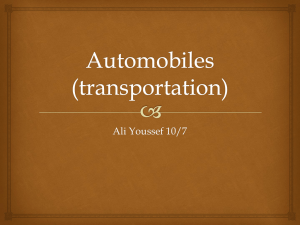AUT 1130 Engine Repair & AUT 113L Engine Repair Lab
advertisement
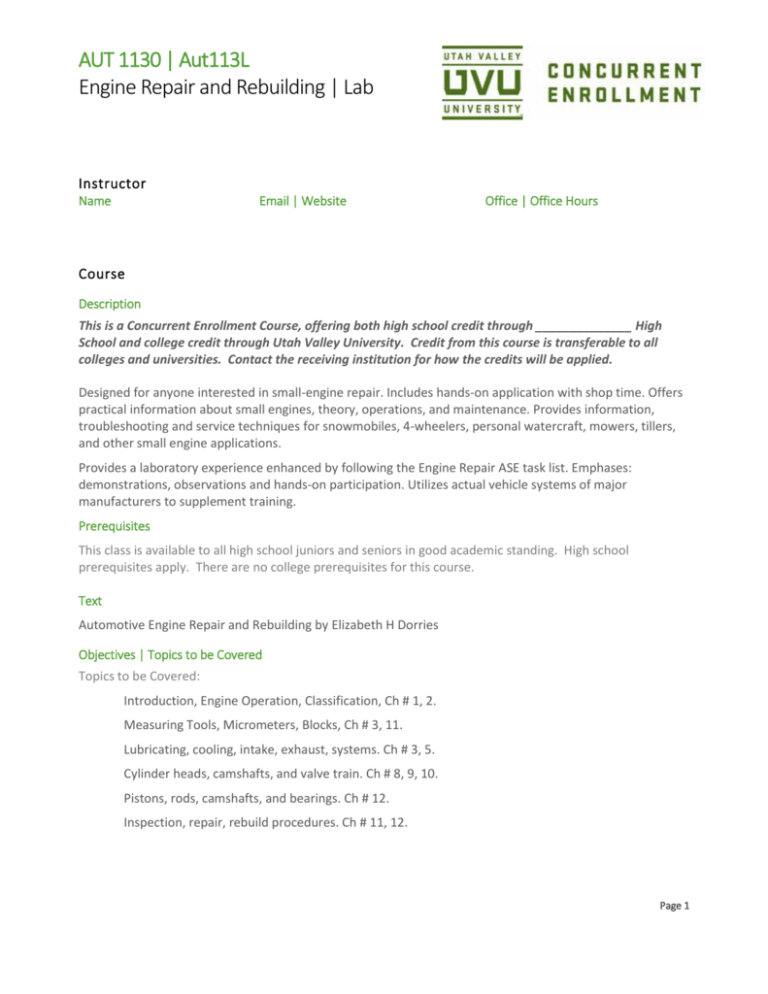
AUT 1130 | Aut113L Engine Repair and Rebuilding | Lab Instructor Name Email | Website Office | Office Hours Course Description This is a Concurrent Enrollment Course, offering both high school credit through ______________ High School and college credit through Utah Valley University. Credit from this course is transferable to all colleges and universities. Contact the receiving institution for how the credits will be applied. Designed for anyone interested in small-engine repair. Includes hands-on application with shop time. Offers practical information about small engines, theory, operations, and maintenance. Provides information, troubleshooting and service techniques for snowmobiles, 4-wheelers, personal watercraft, mowers, tillers, and other small engine applications. Provides a laboratory experience enhanced by following the Engine Repair ASE task list. Emphases: demonstrations, observations and hands-on participation. Utilizes actual vehicle systems of major manufacturers to supplement training. Prerequisites This class is available to all high school juniors and seniors in good academic standing. High school prerequisites apply. There are no college prerequisites for this course. Text Automotive Engine Repair and Rebuilding by Elizabeth H Dorries Objectives | Topics to be Covered Topics to be Covered: Introduction, Engine Operation, Classification, Ch # 1, 2. Measuring Tools, Micrometers, Blocks, Ch # 3, 11. Lubricating, cooling, intake, exhaust, systems. Ch # 3, 5. Cylinder heads, camshafts, and valve train. Ch # 8, 9, 10. Pistons, rods, camshafts, and bearings. Ch # 12. Inspection, repair, rebuild procedures. Ch # 11, 12. Page 1 Lab Work: Orientation, safety Identification, tools, fasteners Block disassembly and measuring Crank, rods, pistons Value trains service Reassembly techniques Department Policies Attendance and Participation Regular attendance and participation is an absolute for the successful completion of this course. Assessment Participation ~ Assignments ~ Grading Philosophy Engine Repair and Rebuilding Research Assignment is worth 100 points it must be completed in a professional manner. Specific directions will be given in class. Summary must be typed; double spaced, and should be about two paragraphs long. The article you read must be from a recent publication within the last two to three years. Read an article on engine repair or rebuilding Photocopy the article Summarize the article in your own words Document your resources Be prepared to explain/demonstrate information to the class All lab assignments are recorded in the Lab Task Procedures Booklet. They must be legible and accurate. All personal projects require a work order. As in industry, each student will be expected to provide their own basic set of hand tools to complete the lab assignments. Case Study Assignment is worth 100 points. It must be done in a professional manner. You must choose seven different case studies from you lab book. You must read them and type up at least a paragraph of your reflection and thoughts on each one. When you are done you should have seven different paragraphs, each one labeled as to which chapter you used. 2 Safety will be stressed and safety glasses will be required in lab. Horseplay will not be tolerated. Failure to comply with safety standards will result in disciplinary actions including but not limited to removal from the lab until such time as compliance is met and maintained. Student’s grades are composed of participation points earned in class, class assignments, quizzes and tests. Grading Scale A = 100-94 B - = 82-80 D+ = 69-67 A - = 93-90 C+ = 79-77 D = 66-63 B+ = 89-87 C = 76-73 D - = 62-60 B = 86-83 C - = 72-70 F = 59-0 Grades and Credit You will receive the same grade for your high school course as you receive for your college course. Your grade for this class will become part of your permanent college transcript and will affect your GPA. A low grade in this course can affect college acceptance and scholarship eligibility. University Policies Academic Integrity Utah Valley University expects all students to maintain integrity and high standards of individual honesty in academic work, to obey the law, and to show respect for others. Students of this class are expected to support an environment of academic integrity, have the right to such an environment, and should avoid all aspects of academic dishonesty. Examples of academic dishonesty include plagiarizing, faking of data, sharing information during an exam, discussing an exam with another student who has not taken the exam, consulting reference material during an exam, submitting a written assignment which was authored by someone other than you, and/or cheating in any form. Violators of this policy will be subject to disciplinary action. Cheating will not be tolerated. It will result in a FAILING grade for the course. In keeping with UVU policy, evidence of academic dishonesty may result in a failing grade in the course and disciplinary review by the college. Additional information on this topic is published in the student handbook and is available on the UVU website. Page 3 Students with Disabilities If you have any disability, which may impair your ability to successfully, complete this course, please contact the Accessibility Services office, 863-8747, BU 146. Academic accommodations are granted for all students who have qualified documented disabilities. All services are coordinated with the Accessibility Services office. Dropping the Class _________ is the last day to drop the course without it showing on your transcript. _________ is the last day to withdraw from the class. If you drop the high school class, you must also withdraw from the UVU class to avoid receiving an E or UW (unofficial withdrawal). 4
